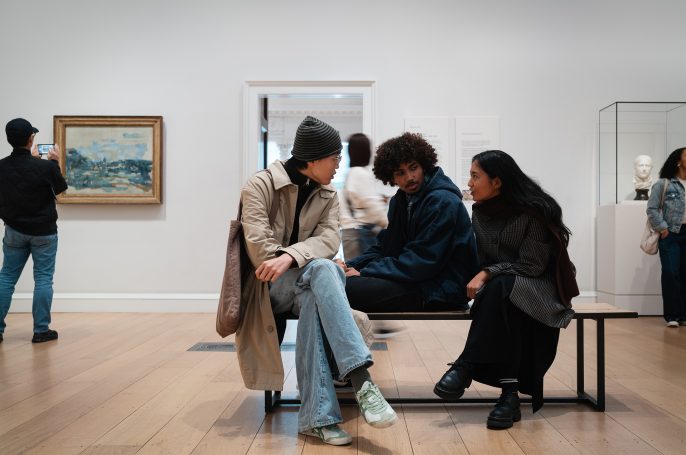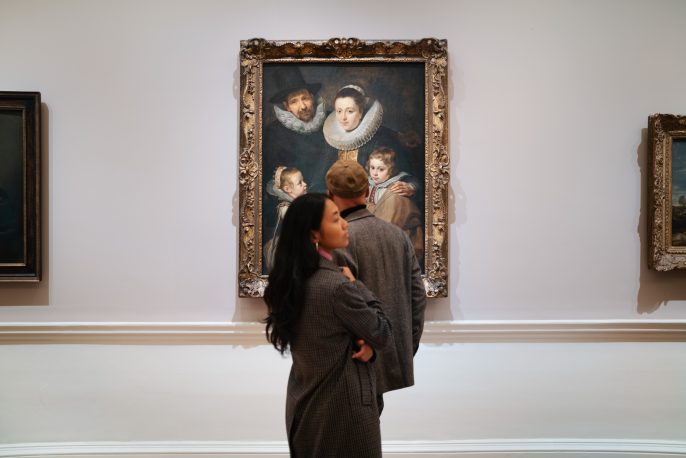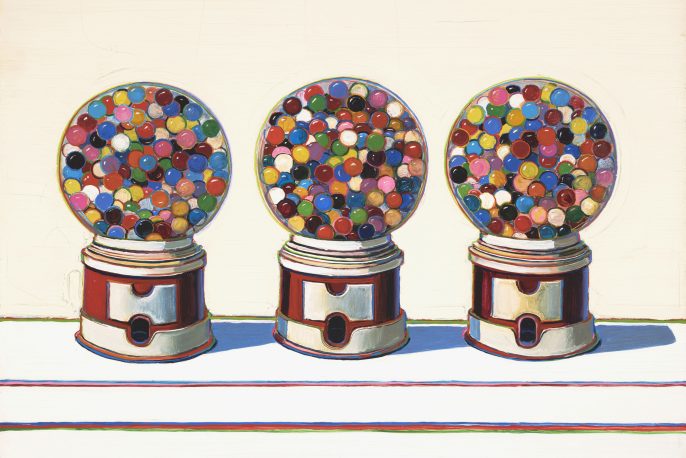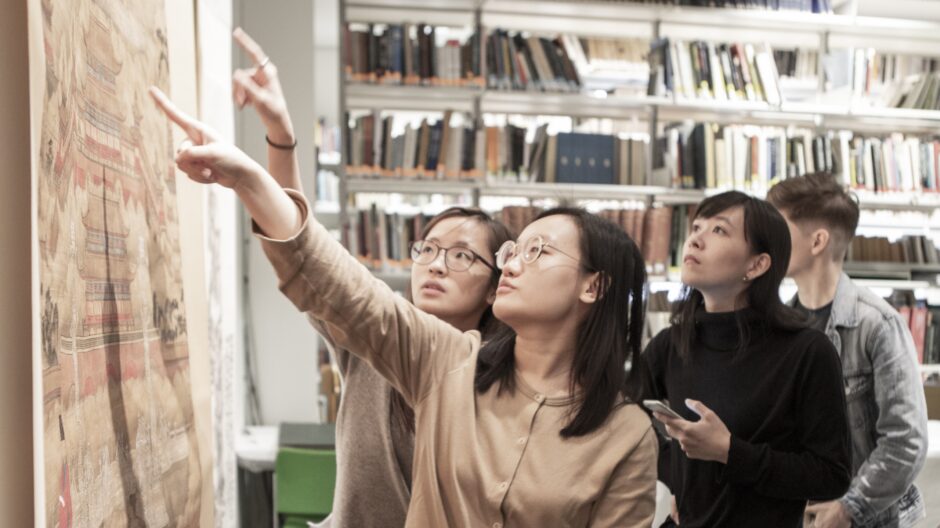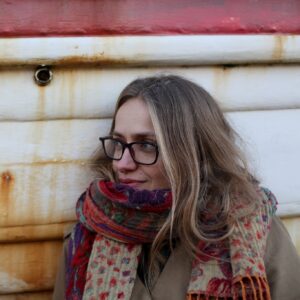Course Overview
Status
Applications open - apply by 12 January
Location
Vernon Square Kings Cross, London WC1X 9EP
Duration
9 months, full-time
Awarding body
University of London
Intake
230 - 250 students per year. Special Option group size: 10 - 12 students.
Are you interested in joining one of the world’s most ambitious and extensive graduate programmes focused on the history of art? Are you eager to break new ground in the understanding and appreciation of art through time?
The Courtauld’s MA in History of Art is one of the largest graduate Art History programmes anywhere in the world and offers an unrivalled combination of breadth and depth. The course provides the best research-led teaching in a unique, single-subject setting. This rich academic resource is complemented by the internationally renowned excellence of the Courtauld Gallery, which is famous for the quality of its collection and the ambition and scholarship of its exhibition programme.
The programme excels at developing well-rounded and intellectually astute art historians and museum professionals equipped to make an important contribution to public life. Alongside art-specific professional paths, MA History of Art offers a context and foundation for any career that requires a deep understanding of people and the human experience: from marketing and advertising to fashion and design.
The MA History of Art combines a range of modules and teaching methods. Special Option modules are taught across both semesters. Offering new perspectives on visual and material cultures, the Special Options draw on the research expertise of lecturers and often engage closely with adjacent studies in history, anthropology, politics, philosophy, literature and religion. The Special Option is complemented by two group modules that address key art historical and curatorial concerns through a combination of lectures and discussion classes, aimed to develop your academic and professional abilities. The final module is the Dissertation, which allows you to develop an independent research project, supported by a series of workshops and seminars to build a range of research skills that are relevant beyond academic study.
Across the programme lecturers take full advantage of the Courtauld Institute’s location in the heart of London and aim to expand your professional network and horizons by organising regular exhibition and site visits in London, the UK and beyond, with costs covered by travel grants.
In addition to the mandatory elements of the MA in History of Art, students are invited to continue to expand their engagement with new art-historical research by attending the almost daily series of seminars and conferences organised by the Courtauld’s Research Forum, as well as those hosted by other institutions across London. You are also able to audit lecture programmes including the wide-ranging “Foundations” series that runs across semesters 1 and 2.
Teaching and programme structure
The Courtauld MA History of Art combines a range of modules and teaching methods.
Special Options
These typically take the form of small group discussion seminars, but may also include exhibition or site visits, and – depending on topic – can include trips in or beyond London or the UK.
In some cases, Special Option groups cluster together in the Autumn semester for joint sessions on issues of common concern, before dividing into more specialised groups in the Spring semester. One-to-one tutorials ensure you get tailored feedback on ideas for your assessments from your Special Option tutor.
Critical Debates
In the Autumn semester, students from different Special Option groups come together for ‘Critical Debates’ around particular themes or problems of relevance to their Special Option – interrogating the idea of ‘The Middle Ages’, for example, or examining the migration of people, objects and ideas since the 19th century. Taught through a combination of lectures and discussion seminars, ‘Critical Debates’ provides opportunities for students to engage with issues of broad concern in their chosen art-historical subfield. Students will be taught alongside those from the MA Curating and MA Contemporary Art and the Moving Image, expanding your peer network.
Virtual Exhibition
The Spring semester group module focuses more heavily on questions of display, curation and exhibition, taking advantage of London’s museums and galleries, including The Courtauld Gallery. It is taught through lectures and discussion groups and culminates in a ‘Virtual Exhibition’, an exercise that encourages students to conceive an (imaginary) exhibition or display, judiciously selecting exhibits and writing, for example, a sample label and catalogue entry. The Virtual exhibition complements the assessed essays, as a visually-led exercise that allows students to develop arguments through the selection and juxtaposition of artworks. The Virtual Exhibition often produces some of our students’ most original and inventive work, and has served for many as a stepping stone into issues of museology and curating.
Dissertation
The final component of the MA is the 10,000-word dissertation, submitted in May. A series of classes and workshops help you to prepare for this independently researched assessment, complemented by one-to-one tutorials with a lecturer with specialism in your chosen field (typically your Special Option tutor). Courtauld MA dissertations are often highly original contributions to scholarship across a wide field, regularly commended by external examiners for being of publishable quality.
Special Options
Special Option modules offer new perspectives on visual and material cultures, drawing on the research expertise of lecturers and often engage closely with adjacent studies in history, anthropology, politics, philosophy, literature and religion. All MA Special Option teaching is research-led. In making your choices, please explore our faculty profile pages on the website to discover more about individual research interests and approaches to art history.
Assessment
The formal assessment of the MA History of Art is based on the following components:
- 2 x 4,000-word Special Option essays, submitted in the Autumn and Spring.
- A ‘Critical Debates’ portfolio of short written exercises, submitted in the Autumn.
- A Virtual Exhibition assignment, submitted in the Spring.
- A 10,000-word dissertation, submitted in May.
The MA is an intensive nine-month programme.
Programme outcomes
Upon completion of the MA History of Art, you will have:
- A sophisticated and in-depth grasp of a specific period or field of art history and the intellectual issues raised by its study.
- A sophisticated set of skills learnt from a wide range of leading art history professionals.
- An invaluable expertise in art history, visual culture and literary skills required for success in the art world.
- Competency in the methodological skills, research techniques and sophisticated understanding necessary for participation in a range of employment opportunities and preparation for further academic study
- A broad-ranging view and understanding of the careers available in the cultural and heritage sector.
- An extensive professional network.
Careers and Employability
The Courtauld’s MA History of Art programme addresses a wide range of interests and equips students with the expertise, research, and professional skills for an equally wide range of career paths. This course will ideally suit students interested in pursuing a career in art museums, galleries, the commercial art sector, heritage, publishing, marketing and communications, production, educational organisations, and other cultural institutions, and more.
Students from the programme will join an international network of Courtauld alumni who work across the cultural sector and benefit from the friendships, support, and mentorship available within that community.
Entry Requirements
UK qualifications: Students will normally have achieved a good 2.1 in their Bachelor’s degree (typically in the Humanities or Social Sciences).
Overseas qualifications: Equivalent to a good 2.1 in a UK first degree (e.g. US applicants should have a cumulative GPA of 3.3 or above).
Country-specific qualifications.
Please note that applicants are occasionally invited to interview on a case-by-case basis.
English language requirements: If your first language is not English, we require proof of English language proficiency – please see the English Language Requirements page.
Applications: Please see our How to Apply page for information on the requirements and a link to the application portal. You can also see our Application Guidance for information on required supporting documents and FAQ.
Fees and Funding
View tuition fees
Fees are subject to change each academic year.
Financial support for your studies:
Postgraduate Master’s Loan: Please visit the Student Finance England website for further information and to apply online.
Scholarships: Thanks to the generosity of an international group of committed donors, the Courtauld is pleased to be able to provide financial assistance to postgraduate students in the form of a number of scholarships. The eligibility criteria for different scholarships vary across the institute. Many are restricted by particular characteristics, for example by degree subject or financial need. Please read the Criteria and Application Instructions for each scholarship carefully.
You may be eligible to hold more than one scholarship simultaneously, and you are strongly encouraged to apply to all scholarships for which you fulfil the eligibility criteria.
Find out more about our scholarships.
Alumni Loyalty Scheme: This scheme is open to any graduate of The Courtauld Institute of Art admitted to any postgraduate programme of study. Recipients will receive a 10% loyalty discount off their tuition fee for the duration of the course.
Further information about loans, grants, and bursaries.
Associated programme costs: Special Options may include local, UK or international study trips, typically for 1-2 nights.
Costs will be covered by a travel grant, and students will be informed of international travel as soon as practical.
Please see the general associated programme costs for more information.
Support
To support you through the degree, we offer:
Wellbeing support: We have a dedicated Wellbeing team, with counsellors and advisors.
Academic Skills training: The academic skills tutor offers group and one-to-one classes to help you to develop the skills and confidence you need to succeed on the degree. We also have two Royal Literary Fund fellows who will help you with your writing skills – concentrating on how to structure and improve your writing.
Careers advice: You can access bespoke, one-to-one career guidance throughout your studies. The Courtauld Careers Service offers advice and support on exploring career and further study options, finding internships, enhancing employability, understanding and navigating the jobs and self-employment market, and making successful applications. This service is available to all graduates for up to two years after graduation.
